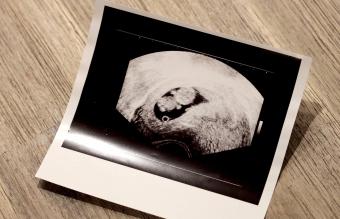
As the end of your pregnancy draws near, you may start to have concerns about spotting in the third trimester. Ten percent of pregnant people experience spotting in their third trimester. Although some conditions that cause bleeding can be very serious, these circumstances only occur in a small number of pregnancies. For most women nearing the 40-week mark, spotting could be a sign that labor is starting.
As labor begins, the mucus plug, which has kept the cervix closed during pregnancy, can fall out, bringing some blood and discharge with it. If this happens, it's time for you to put your birth plan to work and start preparing for labor. However, if you see any kind of spotting throughout your pregnancy, it's a good idea to call your healthcare provider and let them know.
Spotting During Early Pregnancy
Many women experience spotting at some point in their pregnancy, usually in the first trimester. This spotting is often the first sign telling a woman that she could be pregnant. Early pregnancy spotting occurs for several reasons.

First, spotting may occur when implantation happens, usually about 6-10 days after ovulation. Not all women experience this, but those who do may confuse the spotting with the start of a period. Implantation bleeding, however, only lasts a few hours to a day and is light with no definite flow.
Pregnant people also experience spotting during the first few weeks as their body is stretching to accommodate the growing embryo. This spotting can be normal but check with your doctor if you notice it. Any heavy bleeding or clots should be reported to a doctor immediately.
Spotting in the Third Trimester
Bleeding that occurs during the third trimester, which starts at 27 weeks, can be a sign of a potential complication. Anyone who experiences bleeding or spotting in the third trimester should call their doctor's office immediately since this can be a sign of serious problems for both the mother and the baby. Third-trimester spotting can indicate conditions like placental abruption, placenta previa and preterm labor.
Placental Abruption
Placental abruption is caused when the placenta becomes unattached from the uterus. Stomach pain also occurs with the spotting. Because the placenta is not receiving nutrients through the uterus, this is a dangerous condition for the baby.
Placental abruption is more likely to affect older moms, people who have an injury to their stomach, or those who have been diagnosed with sickle cell anemia or high blood pressure.
Placenta Previa
Placental previa can occur when the placenta attaches low in the uterus or covers the cervix. Ideally, the placenta will attach higher in the uterus in an area that can stretch and grow with the development of the baby. When the placenta attaches too low, the stretching in late pregnancy can cause bleeding.
If left untreated, hemorrhaging and preterm labor may occur. Since placenta previa can start without any discomfort to the mother, you should report any spotting to your doctor. Bed rest is one of the most common treatments for placenta previa.
Preterm Labor
Spotting in the third trimester may also be an indication of preterm labor. This is usually accompanied by contractions, fluid leakage from the vagina, and back pain.
If a woman starts labor before 37 weeks, she needs to get to a hospital or doctor's office immediately. In some cases, doctors may be able to stop the labor from progressing to allow the baby more time to develop.
Other Reasons for Spotting During Pregnancy
Since the cervix and vagina have greater blood circulation during pregnancy, spotting can also be caused by any kind of vaginal irritation, including:
- Cervical growths or polyps
- Infection of the vagina or cervix
- Internal exam
- Sexual intercourse
- Uterine fibroids
Your cervix and vagina are very sensitive during this time and can bleed easily.
What to Do if You See Spotting
If you notice spotting at any point in your pregnancy, call your OB-GYN right away. They might ask you to put a new pad into your underwear and check it every 30-60 minutes for a few hours, so your doctor can get a sense of how much you are bleeding.
Your doctor may recommend:
- Drink more water/fluids
- No lifting more than 10lbs
- Pelvic rest (no sexual intercourse)
- Stay off your feet
The difference between spotting and bleeding can be hard to assess, so your doctor will work with you to figure out what's going on. They may have you come into the office to be checked out.
When to Call the Doctor
Though any kind of vaginal bleeding may alarm a pregnant person, light spotting can be harmless and should go away after a few hours. Still, it's always a good idea to talk to a doctor as soon as possible about any spotting in the third trimester to rule out complications.
Your doctor will want to know:
- Color (bright red vs pink vs brown)
- If you saw clots or tissue with the blood
- When the bleeding started
Some people may be tempted to wait and see if the spotting stops on its own, but the American College of Obstetricians and Gynecologists (ACOG) recommends calling your doctor at the first sign of blood. While yes, it may be nothing, your doctor has tools at their disposal to be sure everything is just peachy. Getting reassurance can give you peace of mind too!







